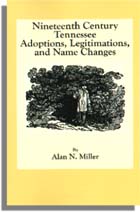
|
|
|
| Product Information: | ||
| Details: | Nineteenth-Century Tennessee Adoptions, Legitimations and Name Changes; by Alan N. Miller; 382 pp; Paper; 5.5x8.5; Published: 2009; ISBN: 9780806354057; Item # CF9914D The primary impetus for most early-day legitimations seems to have been the need to confer rights of heirship for stepchildren or for children born out of wedlock. Thus inheritance could be assured, with change of name and legal custody optional. Originally in Tennessee this was done by petitioning the Assembly for a Private Act. In 1805 the legislature acted to allow lower courts to assume this function, and in 1827 the Assembly further authorized the Circuit Courts to change the name of any person, provided that the petition set forth in writing "good and sufficient reasons." In 1852, Public Law 338 of the Tennessee General Assembly was passed, amending the Acts of 1805 and 1827. This law gave concurrent jurisdiction to the County and Circuit Courts to authorize or refuse adoptions, thereby conferring on the adoptee the same rights as any child naturally born to the parents, including the right of inheritance. The adoption records abstracted for this book fall into two categories, in accordance with the legislative history described above: (1) Adoptions abstracted from state legislative records are labeled TPA (Tennessee Private Acts), followed by the volume number of the printed minutes for that year, then by the chapter/section numbers; (2) Adoption proceedings in local courts have been recovered from widely scattered, mostly-unindexed Minutes of the County Courts. Only in a few counties were adoption cases located in the Circuit Court Minutes, most of them antebellum. The minutes of the County Courts of most Tennessee counties were searched until about 1900, but the search of Circuit Court Minutes was suspended with 1860. The entries in this work have been condensed in order to present all the genealogically significant data in a compact but readable form. Accounts of why a child was available for adoption are always included. These include stories of waifs found on a train, on the porch, in a haystack, or wandering the streets, as well as more mundane tales of abandonment and parental death, disability, or penury. Adoptions in early years were somewhat infrequent in most Tennessee counties, but an increase is seen after the family disruptions due to the Civil War, as well as following the Cholera epidemic of 1873 in Davidson County and the 1878 Yellow Fever epidemic in Shelby County. The emergence of orphanages just before and following the Civil War provided an alternate to apprenticeship or adoption of unwanted or orphaned children. From them, many adoptive children were obtained by childless couples. Some County Judges, especially in Davidson County, actively promoted adoptions. |
|

